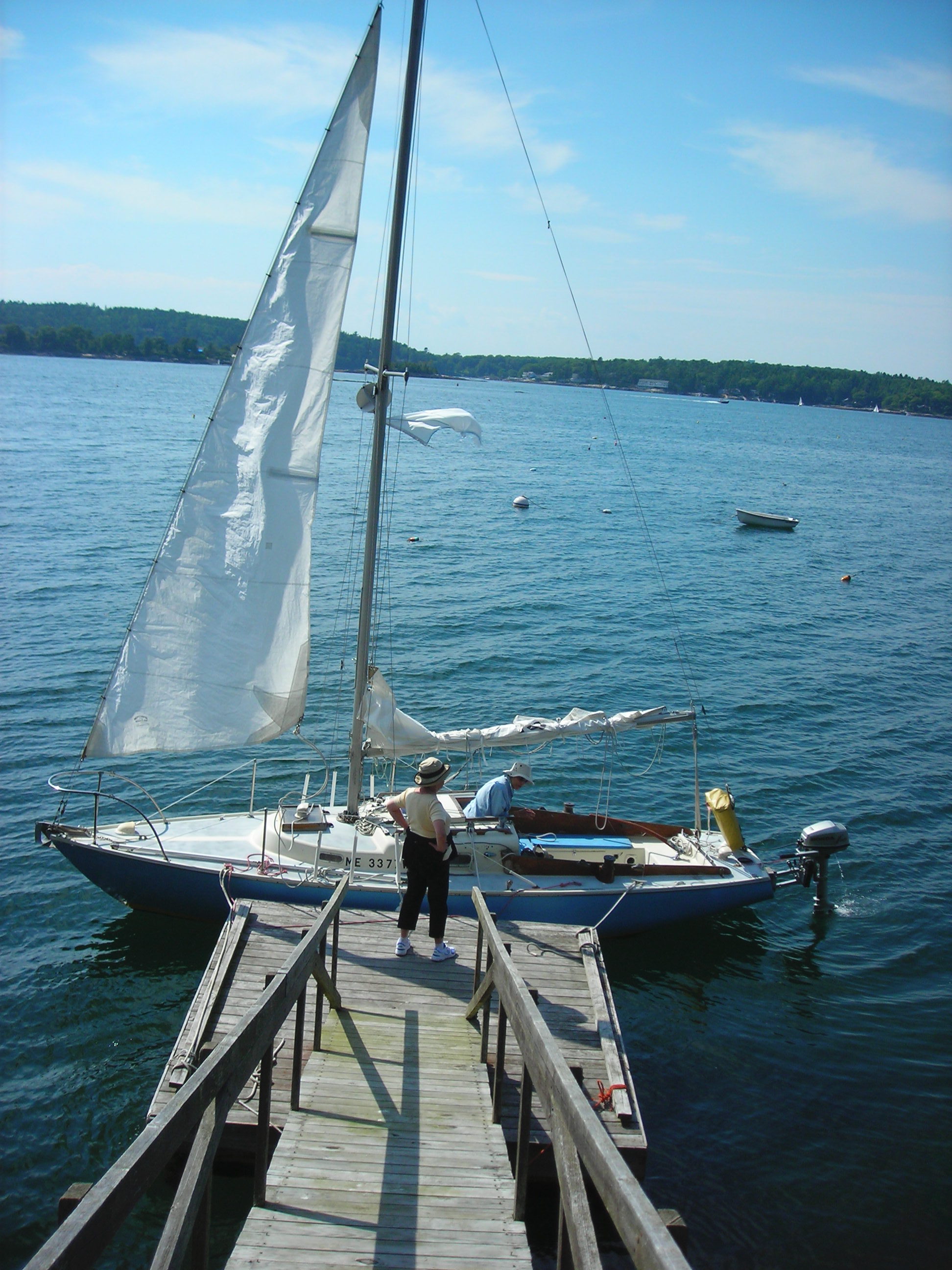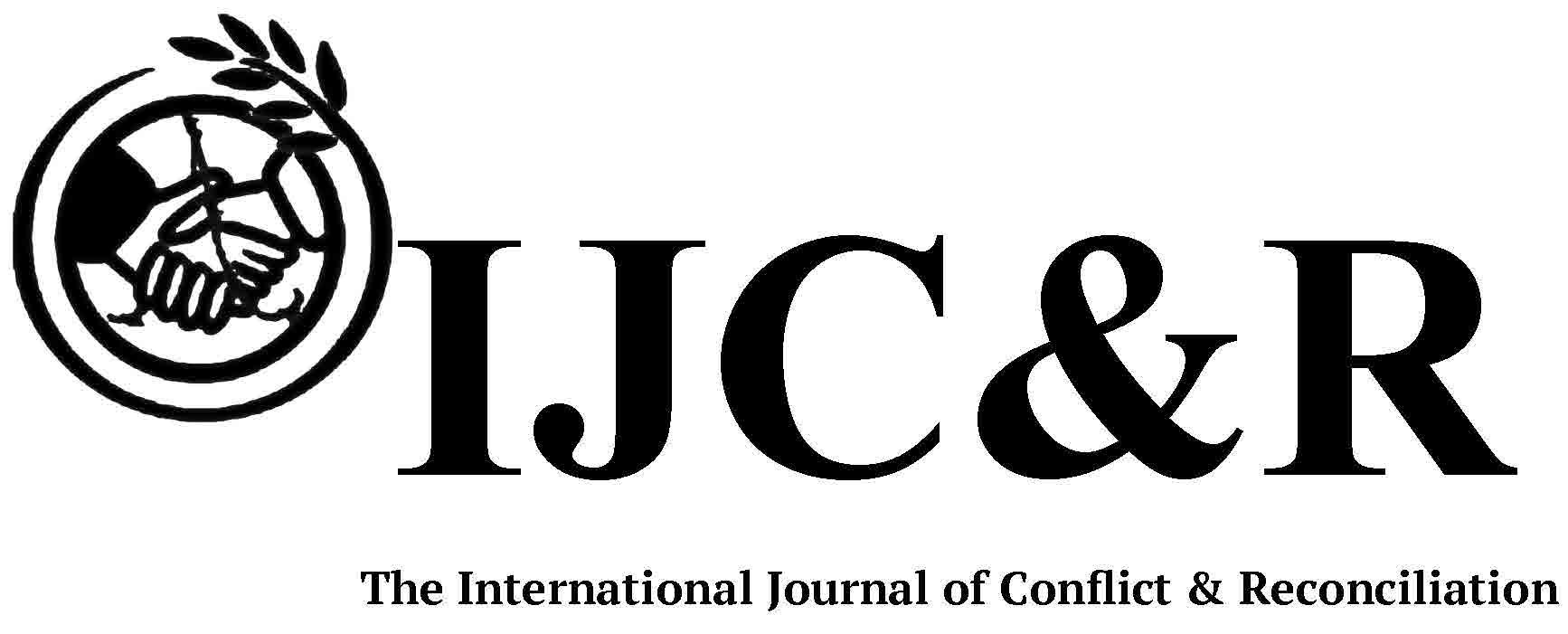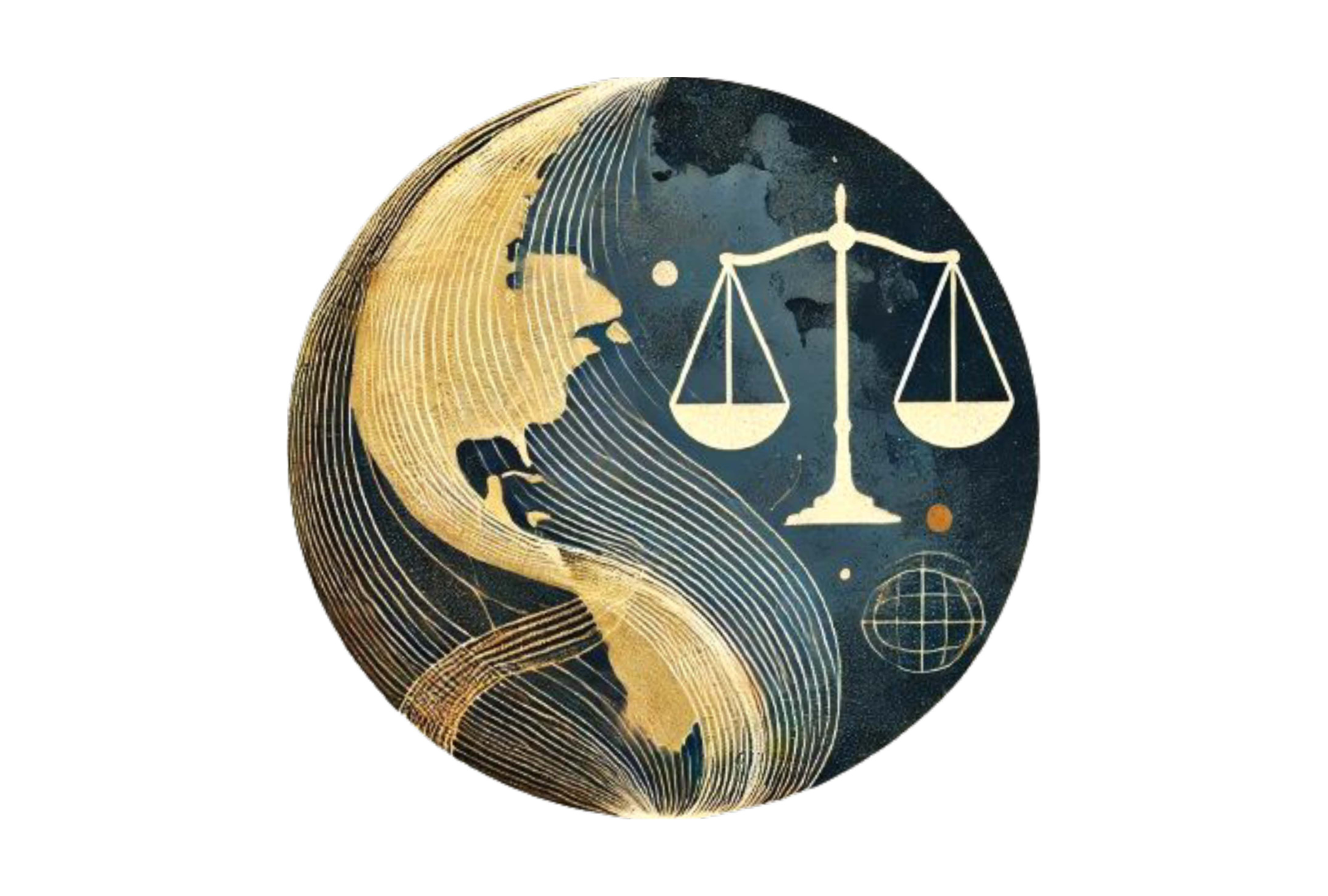The International Journal of Conflict & Reconciliation
Mission Statement
The International Journal of Conflict & Reconciliation is the official journal of the University of Missouri-Columbia Peace Studies Program supported by the College of Arts and Science. It is a peer-reviewed interdisciplinary journal that seeks to further debate on the pursuit of peace in a non-violent manner. As a transformational forum, the International Journal of Conflict & Reconciliation aims to link all relevant areas of inquiry: the sciences, social sciences, humanities, policy analysis, environmental studies, gender studies, etc., to the quest for peace. The editors welcome research and theoretical articles, as well as activists' reports and book reviews that further global discussion on the nature of peace and its relevance to social and economic justice.
Join IJC&R
The International Journal of Conflict and Reconciliation (IJCR) is a peer reviewed interdisciplinary journal devoted to the pursuit of knowledge and continuing inquiry into how conflict in all aspects of life, from the interpersonal to the global, can be resolved in a non-violent manner, how a culture of peace can be developed and maintained in civil society, as well as the nature of the relationship of peace to social and economic justice.
Peace is a scholarly pursuit encompassing all academic areas of society. The Journal welcomes manuscripts from all disciplines (e.g. the fine arts, physical sciences, medical sciences, social sciences, humanities, and professional schools) and seeks to enhance the diverse research one finds in the contemporary academy. The thrust of this endeavor is to create a top quality journal reflective of serious scholarship.
Articles are accepted on the basis of congruence with the stated purpose of the journal, importance of the contribution to existing literature, conceptual and written clarity, and sound methodology. Manuscripts submitted to IJCR may not be published elsewhere except by invitation only.
The Journal uses three formats in publishing. These are 1) the well-established format of publishing individual articles following evaluations by anonymous reviewers, 2) the ‘special issues’ format, either suggested by an interested party or the journal’s editorial board. Each submitted article is peer reviewed, and 3) the point-counter-point format, as seen in volume 4, issue 1. This format has a different review process to which all contributors must agree.
The Journal has a section on Research Notes where authors can submit short articles on ongoing or prospective research, including preliminary findings, methodological issues, and ethical concerns. The editors believe that Research Notes will benefit authors and scholars working on similar issues. Such exchanges could also be the foundation for collaborative future work. Submissions to this section should not exceed 2000 words.
Send manuscript and correspondence to one of the following co-editors:
Richard Hessler
Professor Emeritus of Sociology, Department of Sociology
hesslerr@missouri.edu
Tọ́lá Olú Pearce
Professor Emerita of Sociology & and Women’s and Gender Studies
pearcei@missouri.edu
Anyone interested in reviewing for the journal should contact Dick Hessler or Tola Pearce:
Richard Hessler
Professor Emeritus of Sociology, Department of Sociology
& Women's and Gender Studies
335 Middlebush Hall
University of Missouri-Columbia
Columbia, MO 65211
(573) 882-3441
hesslerr@missouri.edu
Tola Olu Pearce
Professor of Sociology, Department of Sociology
337 Middlebush Hall
Columbia, MO 65211
(573) 882-7265
pearcei@missouri.edu
OUR TEAM
- Tọ́lá Olú Pearce
Professor Emerita of Sociology and Women and Gender Studies, University of Missouri-Columbia
pearcei@missouri.edu - Richard Hessler
Professor Emeritus of Sociology, University of Missouri-Columbia
hesslerr@missouri.edu
- Daive Dunkley
Director of Peace Studies
Professor, Black Studies, University of Missouri-Columbia - Tọ́lá Olú Pearce
Editor, Professor Emerita of Sociology and Women and Gender Studies, University of Missouri-Columbia - Richard Hessler
Editor, Professor Emeritus of Sociology, University of Missouri-Columbia - Grazvydas Jasutis
Reviews Editor, The Graduate Institute of International Development (IHEID), Geneva, Switzerland - Radwa Saad
Copyeditor, The John Galliher Postdoctoral Fellow in Peace Studies & Black Studies, University of Missouri-Columbia - DaiMontre Yancy
Graphic Designer/Cover Image Creator
IJC&R was honored to have Archbishop Desmond Tutu on the international advisory board. With his passing, we offer the following tribute.
- Olabisi Aina, Ph.D.
Professor of Sociology and Gender Studies, Fellow, Social Science Academy of Nigeria, Obáfémi Awólôwò University, Ilé-Ifè, Nigeria - Ali Kazemi, Ph.D.
Professor, Division of Psychology, Pedagogy and Sociology, University West, Trollhattan, Sweden - Hooshang Pazaki, Ph.D.
Professor of Sociology, East Stroudsburg, University of Pennsylvania - Kjell Thornblom, Ph.D.
Professor, Behavioral Sciences, Department of Environmental Systems Science, ETH, Zurich, Switzerland - Takeshi Wada, Ph.D.
Professor of Sociology and Social Thought, Latin American Studies, University of Tokyo, Japan - Sharon Welch, Ph.D.
Professor of Religion and Society, Former Provost, Affiliate Faculty, Meadville Lombard Theological School, Chicago - Anna Kasafi Perkins, Ph.D.
Senior Lecturer, University of the West Indies, Mona - Erika Gubrium, Ph.D.
Professor, Faculty of Social Sciences, Oslo Metropolitan University, Oslo, Norway
RESOURCES
The International Journal of Conflict & Reconciliation uses the Publication Manual of the American Psychological Association, Seventh Edition, for referencing.
TRIBUTES
When Richard Hessler and I took over the editorship of the International Journal of Conflict and Reconciliation, we decided that it would be highly relevant to seek the endorsement of Archbishop Desmond Tutu whose letter of acceptance appears on the website. We suggested to John Galliher (1937-2019) Director of Peace Studies at the time, that he approach the Archbishop, a global icon of peace and reconciliation, and invite him to be an honorary member of our International Editorial Advisory Board. We saw it as a bold move and waited for the Archbishop to respond. We were delighted that he agreed with our mission statement and accepted our invitation. We received his letter of acceptance in 2007, and when the journal moved from the print version to an online version, we were delighted to be able to display his letter. We were therefore saddened to hear of his passing on 26th December 2021 at the age of 90 in Cape Town, South Africa. We intend to keep his letter up on our website as a reminder of what the Archbishop stood for and what we strive for. This latest issue of IJC& R is the first the Peace Studies Program has published since the death of Desmond Tutu. We therefore seek to honor the man who worked so tirelessly for peace, yet was not afraid of being criticized in the process.
Archbishop Desmond Tutu was born on October 7th, 1931 in South Africa. Although he was an Anglican clergy, his thoughts and beliefs were not conscripted by any single religious doctrine as his main focus was fighting for the human rights of all. He therefore worked on many causes including apartheid, racial oppression, gender equality, disability issues, homophobia, and HIV/AIDS. He fought to define us all as human, not just the rich, powerful or racially privileged members of society, and was criticized by even his allies in his peace-making efforts. In 1984, he received the Nobel Peace Prize and in 1986 became the first Black African to lead the Anglican Church in Southern Africa.
Archbishop Tutu was without a doubt the best known member of the South African Truth and Reconciliation Commission, a peace making project set up at the end of apartheid to bring the different groups together. The Commission conducted its work between 1996 and 1998 and although it has received much criticism from both the left and the right, it shone a light on the fact that Indigenous cultures around the world have ideas and institutions to offer as foundations or building blocks for the human race to tap into. The Commission sought to bring to the fore the three important aspects of African approaches to reconciliation within communities where harm has been done: confession, forgiveness and restitution. This package of three pre-requisites for peace is common in many African cultures. The idea that recognition of wrongdoing be devoid of restitution is anathema across African cultures, and perhaps also to other Indigenous cultures around the globe. The focus is on restorative justice. This idea is being reformulated around the world to suit specific cultures. Interestingly, the very first online issue of IJC & R that Richard and I edited (2011) were selected papers from a conference at the University of Missouri on Restorative Justice. Remembering the Truth and Reconciliation Commission in South Africa, one of the most memorial shots was the sight of the Archbishop, the fierce fighter, chair of the subcommittee that heard evidence of human rights violations, overcome with emotion as he bowed his head and wept while listening to evidence. These images remain with us.
As a scholar, the Archbishop authored and co-authored over 10 books which people will continue to use. Tutu is also remember for his many quotes, which continue to circulate. These include: “If you are neutral in situations of injustice, you have chosen the side of the oppressor”; “Do your little bit of good where you are” (he noted that so many feel helpless the face of crushing unjust institutions); and “I am not interested in picking up crumbs of compassion thrown from the table of someone who considers himself my master, I want the full menu of rights”.
We mourn him, but also rejoice with his widow, Nomalizo Leah Tutu and four children that this human being was with us for as long as he was.
Tọ́lá Olú Pearce, Ph.D.
Professor Emerita, Sociology and Women’s and Gender Studies
Co-Editor: IJC&R
Sociologist, Colleague, Mentor, and Friend: A Life Well Lived
Andrew Christian Twaddle, age 82, died of complications from the COVID-19 virus on Wednesday, December 2, 2020 at the University of Missouri Hospital in Columbia, Missouri. He had been the book review editor for IJC&R. Andrew’s death leaves behind his wife of 57 years, Sarah Anne Wolcott Twaddle, daughters Lisa Ruth Wolcott (Domenic Durante) of Gainesville, FL and Kristin Mara Wolcott Farese (James Farese) of Kentfield, CA, five grandchildren, a sister, niece, nephews, and sisters-in-law. Andrew was pre-deceased by his parents, Paul and Ruth Twaddle, and his brothers-in-law, George H. Mason and Peter D. Baird.
Andrew received his BA from Bucknell University in 1961, his MA from the University of Connecticut in 1963, and his Ph.D. in sociology from Brown University in 1968. During his undergraduate student years at Bucknell, with the Vietnam War heating up, Andrew was working one summer at Lewisburg State Penitentiary and living at the facility. He received a letter from his draft board asking for information in order to classify his draft status. Andrew filled out the various forms and listed Lewisburg State Penitentiary as his current address, whereby he received a 4F classification, absolving him from military service. Andrew certainly was not in favor of the war, but probably realized the humor of the situation when he received his draft board's response and let it be as a fine story. Andrew joined the faculty of the College of the Holy Cross (sociology), Harvard University School of Medicine (preventive medicine), the Massachusetts General Hospital (medicine), the University of Pennsylvania (sociology and community medicine), Northeastern University (sociology), and the University of Western Ontario (sociology), before settling at the University of Missouri in 1971 where he spent the remainder of his career teaching and doing research. Why, you ask, would a Connecticut Yankee settle in Columbia, Missouri, for his academic career? Well, because Andrew thought that health, sickness, medical care institutions, and medical professions were windows on society, helping to grab the attention and develop the sociological imaginations of students from all academic disciplines. Talcott Parsons, one of Andrew’s colleagues at Harvard, put it well in the Foreword to our book, A Sociology of Health, 2nd. Ed. Parsons wrote, “I have long had the conviction that the study of health and illness and of the professional and other organizations devoted to health care is one of the most important fields in which sociologists and other social scientists, such as economists and psychologists, should work.”
The University of Missouri provided Andrew with a pioneering medical sociology program that secured joint appointments for medical sociology faculty (N=8) in the College of Arts and Science, Department of Sociology, and in the School of Medicine, Department of Family and Community Medicine, Social and Behavioral Science Unit (SBS). SBS had roughly 200 contact hours over the first two years of the medical school curriculum where the medical students attended lectures, learned to interview patients, participated in discussion groups, and had field experiences in urban health care, emergency medical care, and rural health care. In addition, Hans Mauksch, the SBS director, had obtained a medical sociology training grant from the National Institutes of Health, Bureau of Health Sciences Research, that offered fellowships to graduate students who wanted to become medical sociologists, and made Andrew its director from 1975-1978. The grant supported over several M.A. and Ph.D. students and attracted many other non-grant students who worked with medical sociology faculty such that roughly forty M.A. and Ph.D. medical sociology students passed through the sociology department between 1973 and 2000, the year that Andrew retired from the university.
Andrew, ever the innovative teacher, established an informal seminar program as part of the Training Grant graduate curriculum. Medical sociology faculty, graduate students, and any other interested graduate students and faculty across the campus were welcome to attend. Seminars were held in the homes, large and small, of medical sociology faculty. Wine and beer flowed along with a short presentation and discussion. University of Missouri Faculty and students presented as did medical care activists and researchers from elsewhere. A partial list of presenters includes Paul Lazarsfeld, founder of the Bureau of Applied Social Research at Columbia University, H. Jack Geiger, developer of the first comprehensive neighborhood health center for the poor in the United States, Peter Kong-ming New, one of the founders of the Society for Applied Anthropology and the first sociologist to study Barefoot Doctors in China, Ramon Jaurigue, chair of the citizen board of directors for the Tucson Neighborhood Health Center, Judith Swazey, trailblazer with Renee Fox on medical ethics, Elizabeth Kubler-Ross who conceptualized stages of dying, Martin Martel, Andrew’s Ph.D. advisor at Brown University who studied changing race relations, scholars actively protested for racial equality, and whose research on aging influenced Medicare coverage.
Andrew taught death and dying and interviewing to all first-year medical students taking the required Social and Behavioral Science class, and taught six to twelve second-year medical students in the SBS course on inner-city health care. He designed two field trips each semester, one to Kansas City and the other to Chicago. The Kansas City trip was organized to sensitize the students to the barriers that sick low-income residents faced in seeking medical care. Andrew drove the students in a university van and dropped each student off in different low-income neighborhoods with one quarter, their student ID card, and instructions for meeting Andrew the next afternoon for the trip back to Columbia. The Chicago trip exposed the students to inner-city health care, the American Medical Association’s headquarters, and the original Mayor Richard J. Daly. The students visited Mayor Daly at his modest 1939 bungalow in Bridgeport where he had lived his entire life, observed at the then Cook County Hospital, the Spurgeon Jake Winters Free People’s Health Center, a neighborhood clinic funded by the Black Panthers and located at 3850 W. 16th Street, and spent Sunday morning at breakfast with the CEO and other members of the AMA at their penthouse board room on the Gold Coast overlooking Lake Michigan. During one of the AMA presentations, a politically conservative medical student, known among his classmates as a staunch opponent of single-payer health insurance, leaned in toward Andrew and said, “Man, this is a long way from the Spurgeon Jake Winters Clinic.”
Andrew and I both arrived at the University of Missouri in the summer of 1971 to join medical economists, psychologists, epidemiologists, and family medicine clinicians who had “invaded” the medical school. Hans Mauksch compared our effort to the Normandy Beach invasion in WWII as we attracted lots of medical student hostility in those early years. Andrew helped keep our morale up with his brilliant sense of humor, e.g., arguing with Bruce Biddle, a fellow role theorist and admirer of Andrew’s work on the sick role, over who was going to be the verb and who the noun would be at a planned joint lecture. Would it be “Biddle the Twaddle or Twaddle the Biddle?”
At Missouri, Andrew and I “grew up” together as husbands, fathers, and medical sociologists. We collaborated on two books, did field research together in Sweden, and shared a love of family, medical sociology, ocean sailing, photography, and poetry.
Through it all, Andrew never lost his love for Sarah, family, profession, sailing, nor his sense of humor. I’m hoping to see him again, sometime, maybe on his sailboat Lagom, running with the wind under a full spinnaker in 10-foot seas.

Richard M. Hessler, Ph.D.
Professor Emeritus
University of Missouri – Columbia
Co-editor: IJC&R

Copyright © 2009, International Journal of Conflict & Reconciliation. All rights reserved. ISSN 2157-0620
321 Gentry Hall | University of Missouri-Columbia | Columbia, MO 65211 | (573) 882-6229
